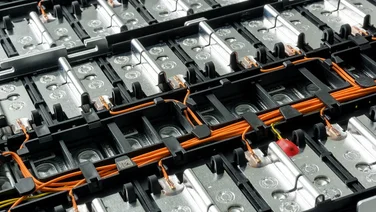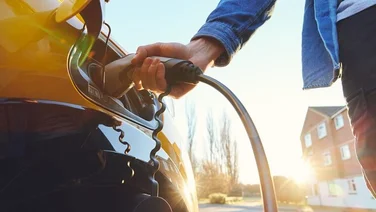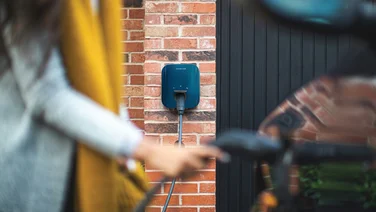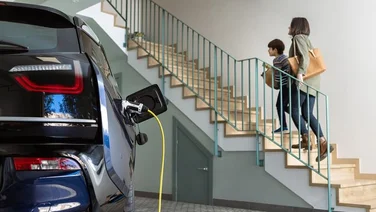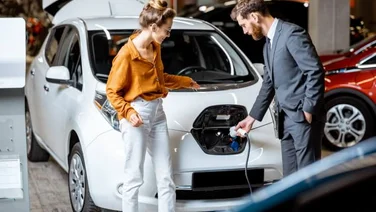We receive a small fee from trusted installers when you request a quote through our site. This helps us keep our content independent, well-researched and up to date – Learn more
An increase in the number of electric vehicles (EVs) in the UK will lead to better energy security than new oil licences in the North Sea, according to new analysis from the Energy and Climate Intelligence Unit (ECIU).
The government announced in November 2023 that it would be awarding new annual licences for oil and gas extraction in the North Sea, in a bid to “bolster the UK’s energy security and reduce dependence on imports from overseas”.
The plans have been criticised as being at odds with the government’s pledge to reduce UK emissions to net zero by 2050, despite government assurances that these new licences fit into its Net Zero Strategy.
The new ECIU analysis suggests that reducing reliance on petrol by boosting EVs is a much better long-term strategy than drilling for more oil.
The ECIU estimates that there will be 6.3 million fully electric EVs in the UK by 2030, up from the current 1 million, according to the latest EV statistics. These 6.3 million EVs would limit the UK’s reliance on foreign petrol imports to the same degree as new UK oil licences, since, according to the ECIU, only around 20% of oil from UK oil fields is used at home, the rest is exported.
These latest findings were based on data from a previous study by the ECIU, which showed that fuel from the UK’s new North Sea licences would only make up 1% of a tank of petrol.
The number of EVs in the UK is expected to increase even more past 2030, with EVs overtaking petrol and diesel cars in the coming years, making the need for new oil fields even more obsolete.
This seems to be exemplified by the fact that the EV industry is booming, getting more competitive, and more innovative. Dr Simon Cran-McGreehin, Head of Analysis at ECIU, said:
“The licencing debate only distracts from a more permanent solution to securing the UK’s energy independence which means building out British renewables more quickly to power homes and EVs as well as cutting energy waste by insulating roofs. The Government’s recent track record on some of these policy areas is less than stellar”.

EV giant Tesla sees annual profits drop as competition intensifies
Tesla, the US-based EV giant, revealed last week that it saw its profits drop for the first time ever in 2023, according to The Telegraph. This comes as Chinese car maker BYD overtook Tesla in EV sales in the final quarter of 2023.
Tesla’s decline in profits is mainly because the company has had to slash its prices as it faces new competition from established car manufacturers such as BMW and Toyota, who are branching out into the EV market, and Chinese brands, like BYD and Nio.
The price of Tesla’s popular Model 3 car dropped by 17.5% between the start and end of 2023, according to the Telegraph.
Tesla is switching gears in order to increase its profits again by outselling the competition, and plans to start mass production of cheaper vehicles, costing $25,000 USD, by the middle of next year.
Battery breakthrough at Harvard University could make EVs cheaper and more desirable
One key way to make EVs cheaper is through battery innovations. The goal: appeal to customers by making cheaper to produce, longer lasting batteries, with a longer range.
The latest innovation comes from scientists at Harvard University, who have developed a new solid-state battery that charges as quickly as it takes to fill up a petrol car, and has a lifetime of 30 years – both factors the scientists claim will reduce the cost of an EV.
The current battery standard in the EV industry has been lithium-ion batteries that use a liquid electrolyte (solid state batteries have a solid electrolyte).
Lithium-ion batteries have come under scrutiny in recent years because of human rights violations linked with mining cobalt, a key mineral used in this type of battery. There are also concerns about the safety of lithium ion batteries, and their tendency to fail in temperature extremes.
This has started a race among manufacturers to develop the best solid state battery, with Toyota and Hyundai already developing their own.
Battery innovations are crucial to increasing the appeal of EVs, since batteries with a longer range that can charge faster, will mean owners won’t have to worry about charging their EVs as often.
Anxiety over charging and charging times, particularly given the lack of public rapid chargers in the UK, and the fact that not everyone can install an EV home charger, are some of the key obstacles preventing people from investing in an electric car.


